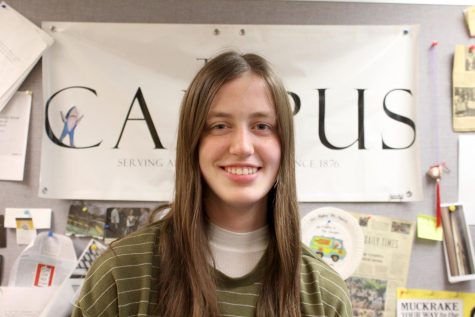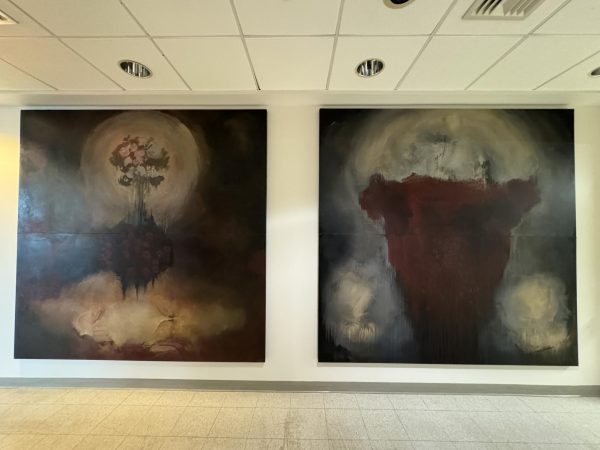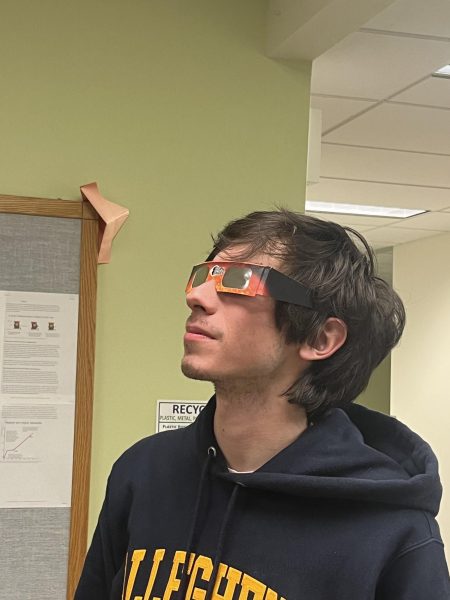Students tour sustainable urban development cities
The fight against the ‘geography of nowhere’
Allegheny students are set to explore the world’s first EcoDistrict as part of a series of sustainable urban development field trips. Allegheny’s Law and Policy program, Environmental Science and Sustainability department, and the Meadville Climate Action Plan group teamed up to bring together students and community members for a set of trips to sustainable urban development areas in Cleveland on Nov. 4, and Pittsburgh on Nov. 7.
“It’s an ideal way for students not only to educate themselves experientially, but to actually learn about what are the best practices so to speak for dealing with climate change,” said Professor Emeritus of English David Miller. “This is a way to actually learn by experience and practice.”
These upcoming trips are the first of their kind. Last year there were a few attempts at starting a program teaching about the intersections between environmental policy and economics, but the program went under due to lack of student involvement. As a result, these trips serve as a way of reviving the efforts of that program.
“Just getting people excited and giving them a concrete notion of what fighting climate change looks like and what it can do,” Miller said. “It’s the capacity to become committed to something because you see it working in the flesh so to speak.”
Although it may seem like fighting climate change is an issue that concerns only certain communities, such as those living in coastal areas, Miller explained that climate change impacts every community.
“It doesn’t seem to be quite so bad now, but the implication is that (in) our area, climate change is going to really affect us through a surplus of water,” Miller said. “I have relatives in New Mexico that are suffering from the opposite problem.”
One way to curtail the impacts of climate change: sustainable urban development.
According to Miller, sustainable urban development focuses on preserving natural resources and creating a more equitable society for all members of the community.
“It’s not just sustainability,” Miller said. “It’s tied in with equity, fairness and inclusiveness. People who by and large are going to suffer the most are those on the bottom of the socioeconomic ladder.”
According to Miller, EcoDistricts and cooperatives are two great solutions to overcome these issues. Cooperatives focus on building community based wealth. On Nov. 4, students toured the Evergreen Cooperatives in Cleveland. The cooperatives build community-based wealth by maintaining the strength of small businesses in the area, Miller explained. For example, their website showcases a system they set up to help small business owners retire by buying the business from them. Building up wealth within the community is important because it stops what Miller described as “community destroyers” — big-box companies like Walmart — from creating a “geography of nowhere.”
“We’ve created this kind of dystopia,” Miller said. “It’s all about shopping, asphalt and strip malls.”
“Geography of nowhere” is a concept of American Author James Howard Kunstler, which describes the world as a series of the same buildings over and over again. This repetition and urban sprawl that accompanies it wastes land area that could be better used for agriculture and natural habitats, Miller explained. It also is incredibly expensive and creates a lot of greenhouse gas emissions from cars driving all over the place.
“Are we really going to allow the corporate order to dictate and undermine communities or are we going to try to grow community through cooperatives and EcoDistricts?” Miller asked.
Similar to cooperatives, EcoDistricts build up the strength of local communities with more of a focus on resource redistribution, explained Assistant Professor of Environmental Science and Sustainability Jesse Swann-Quinn. The trip to Pittsburgh on Nov. 7 will explore how EcoDistricts function in three different boroughs of the city.
On this trip, students will watch a presentation about EcoDistricts while eating lunch provided by one of the districts. After lunch they will tour the three boroughs with “evolve,” the sponsor behind the EcoDistricts in Pittsburgh.
Swann-Quinn noted that the EcoDistricts in Pittsburgh are the first certified EcoDistricts in the world. They were certified by the Coalition of Partnership for Southern Equity and EcoDistricts just this past year.
It was the possibility of viewing another EcoDistrict that drew Swann-Quinn to set up this visit to Pittsburgh. He explained that last summer he took an experiential learning trip to Germany where they toured many different sustainable urban development plans, and the EcoDistrict in Freiburg really stuck with him.
“The Pittsburgh district is particularly interesting because it is taking this idea of an ecodistrcit and applying it specifically within our region,” Swann-Quinn said. “I think there are a number of lessons that could be learned and applied on a different scale.”
Aidan McGrory, ’26, was excited for an opportunity to get practical experience in a field they plan to study.
“I have somewhat high expectations because in the informational email, it says that we will be talking about practical policy, which I think is very important because quite a lot of the policy that is being introduced by politicians is not very realistic, whether that be too far one way or the other,” McGrory said.
He looks forward to learning more about how to write and pass practical policy and hoped that the program investigates how to encourage companies to go green. Additionally, the opportunity to eat food off campus enticed McGrory.
“I think the free food is a big pro,” McGrory said.
Both Swann-Quinn and Miller list the meal as a pro as well. They also hoped that these events bring the community together.
“My expectations for (the trips) are to first bring together different members of our community,” Swann-Quinn said. “To help connect people in city government, students, faculty, members of community, anybody who is interested in these different methods to develop our community with an eye towards sustainability.”
As for future plans, both expressed an interest in planning similar trips, but nothing is concrete thus far.
“‘evolve’ has said that they would be happy to entertain up to 40 people in a follow-up,” Miller said. “This is, in a way, an effort to seed that possibility.”
Overall, the goal of these trips is to give exposure to people on campus and within the community to different actions that can and need to be taken to fight climate change and strengthen the community. Sponsored by the Climate Action Plan group, Miller explained that these trips help educate people.
“You have to have a vision,” Miller said. “In many ways, the climate action plan is just that. It’s a vision of a better community all the way around, that is also based in climate change, sustainability and equity.”

Caroline Maye is a first year from Chicago, Illinois. She plans to major in Political Science or History with a minor in Journalism in the Public Interest....






